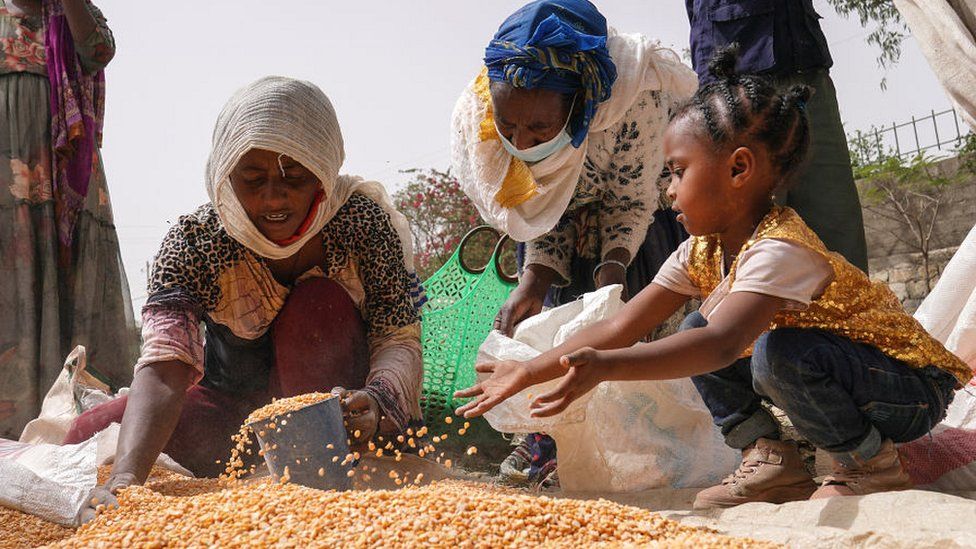Ethiopia: What do we know about aid going into Tigray?
- Published

With conflict continuing in Ethiopia's Tigray region and nearby areas, the government has made a series of claims about the problems in accessing much-needed food supplies.
We have checked some of these claims against what we know about the aid situation in Tigray.
Ethiopian PM's office: 'Aid trucks are prevented from entering Tigray by the [TPLF] group'
At the moment, there's no firm evidence to support this claim about the Tigray People's Liberation Front (TPLF).
The TPLF itself has told the BBC that the government was "coming up with all kinds of excuses" to obstruct the movement of aid supplies into Tigray.
We know the conflict has intensified and spread beyond Tigray, and that land routes into Tigray from the Amhara region were closed.
And there are security issues affecting the one remaining route via the Afar region, which starts from the regional capital Semera, and goes northwards into Tigray at Abala.
Road access through the Amhara region was blocked by militias who support the Ethiopian government, rather than by Tigray forces.
The UN has referred to an incident at a checkpoint in the Afar region on 28 July on the way to Tigray, where two trucks were said to have been stopped and looted by civilians.
But it's not clear who was involved, and whether Tigray rebel forces were in that area at the time.
The UN said that in late July, there'd been various reasons for delays, including the need for permission from the Ethiopian authorities, as well as numerous checkpoints along the route to Tigray.
In a more recent statement on 11 August, the UN humanitarian affairs co-ordinating office said humanitarian access had "significantly improved", with an estimated 75% of the area accessible.
But it also said the flow of humanitarian supplies into the region remained "insufficient".
The Ethiopian government said that as of 11 August, 277 food aid trucks were in Tigray.
We asked UN agencies if they could confirm this, but have not received a response.
In any case, the World Food Programme says it needs to send at least 6,000 tonnes of food a week during August, which means 100 trucks going into Tigray every single day.
Ethiopian PM's office: 'Permits for humanitarian flights have been granted'
The Ethiopian government said that flights into Tigray would be allowed from early July - after being banned in June.
The UN told us there have been recent improvements in the number of flights carrying relief workers to the area.
But in July, there don't appear to have been many flights at all due to strict approval requirements from the authorities - with only two recorded.
The first UN passenger flight wasn't until 22 July, and the other one carried the UN humanitarian chief, Martin Griffiths.
In August, however, four humanitarian flights did go from Addis Ababa to the regional capital of Tigray, Mekelle.
Billene Seyoum, a spokeswoman for the Ethiopian prime minister's office, told the BBC there were security issues to consider: "All efforts are being made to ensure ease in the process with a priority given to security."
The UN estimates that at least two flights a week are needed to rotate humanitarian aid staff in and out of the region.
UN: 'Essential basic services including power and communications [in Tigray] will resume swiftly'
This is from a statement by the office of UN Secretary-General António Guterres on 9 July, after a conversation Mr Guterres had with Prime Minister Abiy Ahmed.
"The [UN] Secretary-General welcomed... the Prime Minister's commitment that essential basic services [in Tigray], including power and communications, will resume swiftly," it said.
The evidence suggests this has not yet happened.
And on 29 July, when we asked the Ethiopian government about this, we were told the "resumption of these services heavily depends on the acceptance of the belligerent group [the TPLF] to a ceasefire."
The government has announced a unilateral ceasefire, but the Tigray rebels want a negotiated truce, with certain conditions met.
Large parts of Tigray still appear to be without power, telephone communications and banking services.
Some people are able to get electricity through generators, but there are shortages of fuel and it's rationed when it becomes available.
On 22 July, Mekelle University posted on Facebook about how it was affected by continuing telecoms shutdowns, internet blackouts and disruption to power supplies, as well as the absence of banking services.
Aid agencies say the restriction of these services is also affecting their operations in the region.
The prime minister's spokeswoman told the BBC the government had been working to restore services.
But she said fighting by the TPLF, and the "destruction of fibre optic cables, transmission lines and attacks on... maintenance workers sent into the region, have made it difficult."